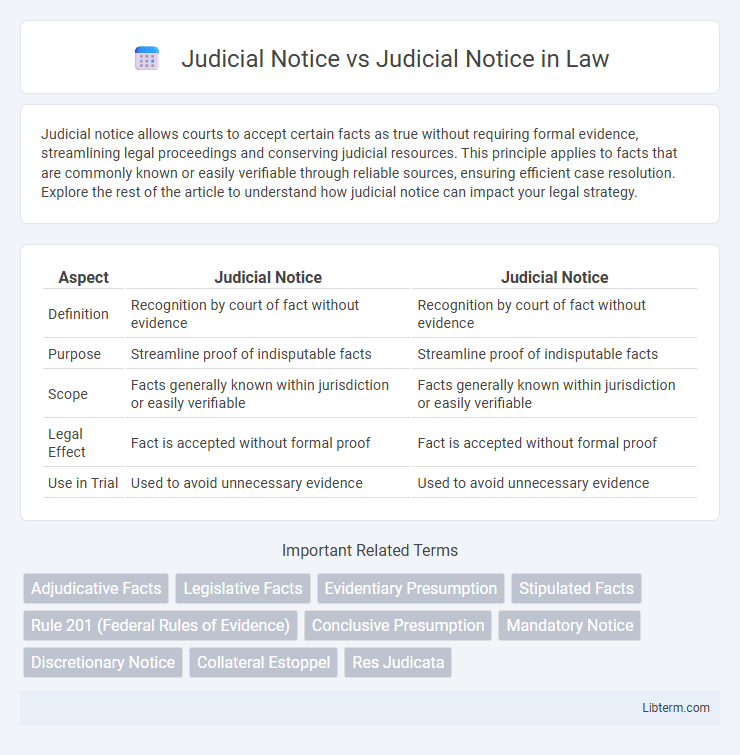Judicial notice allows courts to accept certain facts as true without requiring formal evidence, streamlining legal proceedings and conserving judicial resources. This principle applies to facts that are commonly known or easily verifiable through reliable sources, ensuring efficient case resolution. Explore the rest of the article to understand how judicial notice can impact your legal strategy.
Table of Comparison
| Aspect | Judicial Notice | Judicial Notice |
|---|---|---|
| Definition | Recognition by court of fact without evidence | Recognition by court of fact without evidence |
| Purpose | Streamline proof of indisputable facts | Streamline proof of indisputable facts |
| Scope | Facts generally known within jurisdiction or easily verifiable | Facts generally known within jurisdiction or easily verifiable |
| Legal Effect | Fact is accepted without formal proof | Fact is accepted without formal proof |
| Use in Trial | Used to avoid unnecessary evidence | Used to avoid unnecessary evidence |
Introduction to Judicial Notice
Judicial notice is a procedural tool allowing courts to recognize and accept certain facts as true without requiring formal evidence, streamlining litigation by acknowledging facts that are common knowledge or readily verifiable. This concept eliminates the need for proof of universally known facts, such as the current date or geographical location, ensuring efficient judicial processes. Courts apply judicial notice to facts that are not subject to reasonable dispute because they are either generally known within the jurisdiction or can be accurately and readily determined from reliable sources.
Definition of Judicial Notice
Judicial notice is a legal doctrine allowing courts to recognize certain facts as true without requiring formal evidence, typically facts that are common knowledge or easily verifiable. It streamlines judicial proceedings by accepting indisputable facts such as dates of public holidays, geographic locations, or government proclamations. Courts apply judicial notice to facts not subject to reasonable dispute to ensure efficiency and accuracy in rulings.
Purpose of Judicial Notice in Legal Proceedings
Judicial notice serves to streamline legal proceedings by allowing courts to accept certain facts as true without requiring formal evidence, thereby enhancing efficiency and reducing unnecessary litigation. This tool is primarily used for facts that are either generally known within the jurisdiction or capable of accurate and ready determination from reliable sources. Its purpose is to prevent parties from having to prove indisputable facts, allowing courts to focus on contested issues.
Types of Judicial Notice
Judicial notice is divided into two primary types: mandatory and permissive notice. Mandatory judicial notice requires courts to recognize facts that are not subject to reasonable dispute because they are generally known or can be accurately and readily determined from reliable sources. Permissive judicial notice allows courts discretion to accept facts that are not commonly known but can be verified through authoritative evidence.
Judicial Notice Under Common Law
Judicial notice under common law refers to the court's acceptance of certain facts as true without requiring formal evidence, typically because these facts are widely known or easily verifiable. This principle streamlines legal proceedings by allowing courts to acknowledge indisputable facts, such as official government records or universally recognized information. Unlike judicial notice in statutory contexts, common law judicial notice relies heavily on precedent and judicial discretion to determine what facts are appropriate for recognition.
Judicial Notice in Civil vs. Criminal Cases
Judicial notice in civil cases often pertains to facts that are commonly known or can be accurately and readily determined from reliable sources, such as official government records, to expedite the resolution of disputes. In criminal cases, judicial notice is applied more cautiously to uphold the defendant's right to a fair trial, typically involving facts that are indisputable and not subject to reasonable dispute, like laws or court records. The standard for judicial notice is generally stricter in criminal proceedings due to the higher stakes and the presumption of innocence.
Procedures for Requesting Judicial Notice
Procedures for requesting judicial notice require a formal motion or request to the court, specifying the fact to be noticed and providing sufficient information or sources supporting its indisputability. Courts typically rely on official records, statutes, or facts universally recognized and not subject to reasonable dispute when granting judicial notice. Timely submission of this request during trial or in pre-trial motions ensures efficient judicial proceedings and conclusive acceptance of the fact without requiring evidentiary proof.
Limitations and Restrictions on Judicial Notice
Judicial notice is limited to facts that are not subject to reasonable dispute because they are generally known within the court's territorial jurisdiction or can be accurately and readily determined from reliable sources. Courts cannot take judicial notice of facts that are contingent on disputed evidence or require expert interpretation, ensuring fairness in adversarial proceedings. The scope of judicial notice varies by jurisdiction, with some courts restricting notice to adjudicative facts rather than legislative facts, and certain rules bar taking judicial notice during jury trials if it infringes on the jury's role in evaluating evidence.
Judicial Notice vs. Judicial Admission
Judicial notice and judicial admission serve distinct roles in legal proceedings; judicial notice allows a court to recognize facts that are commonly known or easily verified without requiring evidence, expediting the trial process. Judicial admission occurs when a party explicitly acknowledges a fact or issue, which then binds the party and removes the necessity to prove that fact later. Understanding their differences is crucial for legal strategy, as judicial notice involves court recognition of certain facts, whereas judicial admission is a direct concession by a party in the case.
Conclusion: Significance of Judicial Notice in Court
Judicial notice plays a crucial role in court by allowing judges to accept certain facts as true without requiring formal evidence, thereby streamlining the legal process and reducing delays. Its significance lies in enhancing judicial efficiency and ensuring consistent application of commonly known or indisputable information. This procedural tool ultimately supports fair and expedient case resolution by focusing resources on genuinely disputed issues.
Judicial Notice Infographic

 libterm.com
libterm.com